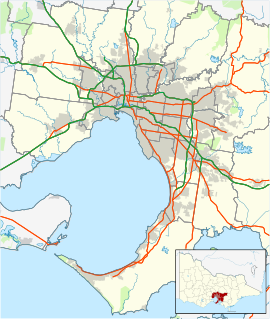Mooroolbark
|
Mooroolbark Melbourne, Victoria |
|||||||||||||
|---|---|---|---|---|---|---|---|---|---|---|---|---|---|
| Coordinates | 37°47′06″S 145°18′54″E / 37.785°S 145.315°ECoordinates: 37°47′06″S 145°18′54″E / 37.785°S 145.315°E | ||||||||||||
| Population | 20,689 (2011 census) | ||||||||||||
| • Density | 1,556/km2 (4,029/sq mi) | ||||||||||||
| Postcode(s) | 3138 | ||||||||||||
| Area | 13.3 km2 (5.1 sq mi) | ||||||||||||
| Location | |||||||||||||
| LGA(s) | Shire of Yarra Ranges | ||||||||||||
| State electorate(s) | |||||||||||||
| Federal Division(s) | Casey | ||||||||||||
|
|||||||||||||
Mooroolbark is a suburb of Melbourne, Victoria, Australia, 31 km east of Melbourne's central business district. Its local government area is the Shire of Yarra Ranges. At the 2011 census, Mooroolbark had a population of 20,689. Mooroolbark is at an altitude of approximately 93m.
"Mooroolbark" has been popularly believed for some time to have the meaning "red earth", leading to extensive use of that meaning in the community. More recently it has been suggested that "Mooroolbik" is the name given by the local Wurundjeri Aboriginal people ("moorool" meaning great water and "bik" meaning place). An alternative meaning of Mooroolbark being "the place where the wide waters meet" is recorded by Museum Victoria. Another meaning recorded is "red bark".
The Parish of Mooroolbark was surveyed in 1855, with a township originally called Brushy Creek standing where North Croydon is today. The name "Mooroolbark" was to be popularised with eventual European settlement in the late 19th century. A rural hub developed around the train station, which opened in 1887 and offered rail access to Melbourne. The Post Office opened shortly after on 15 March 1888.
Wonga Park used to be a part of Mooroolbark until the early 20th century when it became a separate suburb. Another locality called Mooroolbark Park was later renamed as Chirnside Park.
Mooroolbark has a train station which is on the Lilydale railway line. It has 595 car parking spaces. In 2011 current member of parliament (Tony Smith) proposed the Matlock express way an alternative to the 'five ways'.
...
Wikipedia

